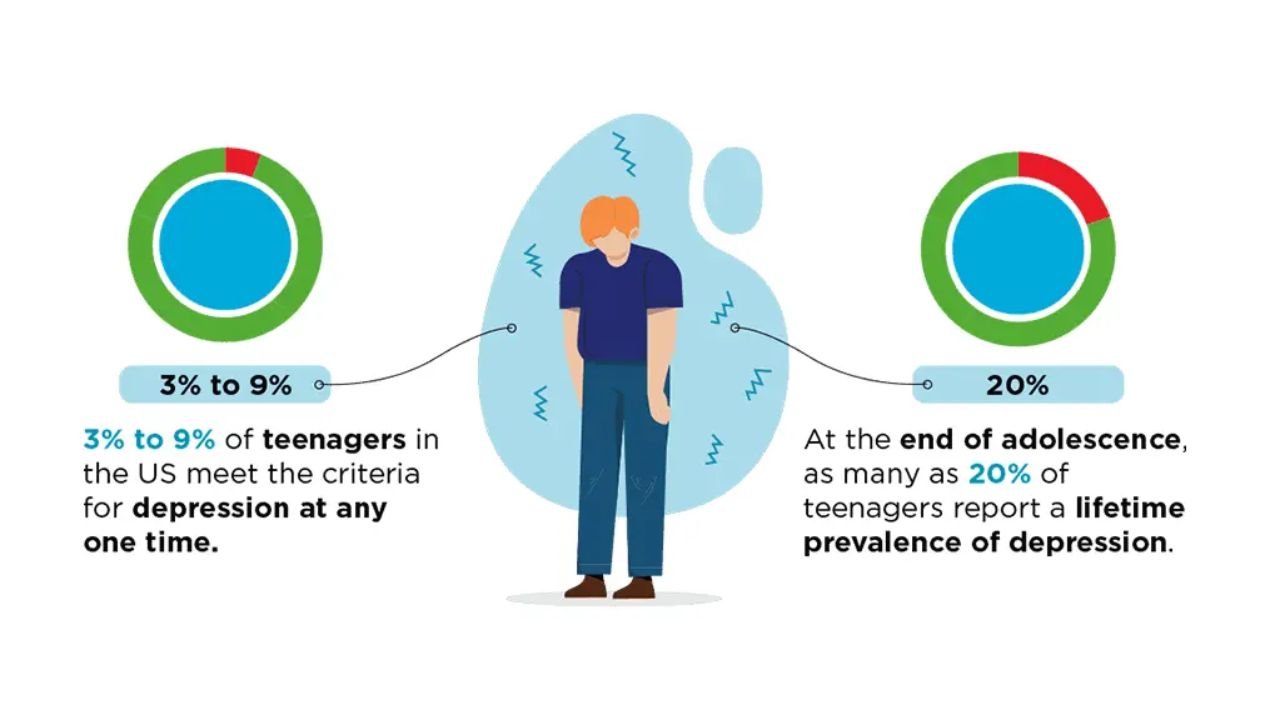During these years, hormones cause teenagers to act in unexpected and complicated ways. Sometimes, teens are so cheerful and brave it seems they can run the world; yet, the next minute they can be upset and stressed out because of things they think they should have.
It is common for hormonal changes to damage their overall well-being and mood. Besides, if emotional distress is not dealt with, it may result in depression in teens. However, it’s important to understand exactly what depression is. Let’s check out the article down below to see what it says.
How can Depression be defined?
Do fundamental tasks regularly seem difficult for you ? Do you find it hard to focus for any period of time ? Are you usually sad or without energy most of the time? In that case, these may be symptoms suggesting one might have depression.
Depression is a problem that touches many people in different parts of the world. Clinical depression does not depend on age, gender or race, since it can impact all these groups of people.
A person suffering from depression often behaves differently when social cues are given. While teenagers and kids become more abusive, adults grow uncomfortable with others and develop anxiety. At the same time, not addressing depression in seniors may result in other mental health issues such as phobias and eating disorders.
How does Depression appear in teenagers?
Emotional ups and downs do not always mean a person has depression. Particularly, teenagers are more likely to be moody due to the different changes in their bodies and lives.
It’s necessary to understand that depression happens year-round, not just during certain times. It does not fade away as time passes by. Depression is diagnosed using particular criteria. If we have the necessary information and resources, we may find out about our symptoms early and get help immediately. In addition, online quizzes for depression can help you tell if what you are experiencing is close to a depression prognosis.
Growing up during teenage years makes people experience changes in behavior, social skills and emotions. There are some signs that may indicate that your teen is feeling depressed such as :
Antisocial Behavior
Has it ever happened that a socially involved kid becomes isolated as they enter their teenage years? This is considered one of the main signs related to depression.
Sometimes depression leaves us so tired that being with friends is not easy. Typically energetic teenagers feel the effect of this sudden loss of energy more than others. If they often isolate themselves, it becomes hard for them to come out of antisocial behavior on their own.
Poor Sleeping Habit
Those experiencing insomnia may have sleepless nights even when they feel very worn out so easily . So, our body responds by taking rest in different forms. Not getting enough sleep or sleep at odd hours can cause you to feel tired and irritable after. Such feelings might be indicative of depression, since a person couldn’t motivate themselves to complete any work.
Changes to the pet’s appetite
Many people connect emotional eating to depression. Many teenagers who are criticized about their changing bodies fall victim to it during puberty. As they deal with the bullying by overeating, it can cause the onset of eating disorders.
A change in how much you eat can cause different problems with your health, especially when you are an adolescent. While going through puberty teenagers require healthy food to grow, yet severe changes in their eating habits can negatively affect development. Seek advice from a professional if your teenager has trouble with how they eat.
People with these issues often act spontaneously and show risky behaviors.
Typically, depressed teenagers act fast and display unsafe tendencies. Therefore, they may start abusing drugs or alcohol. Moreover, individuals in this category are also likely to experience suicidal thoughts and choose to hurt themselves.
Persistent Sadness
Depression is different from a regular mood swing because it is a persistent sadness. Experiencing sadness is a usual human experience. Everyone feels a little sad sometimes, but such feelings are troubling when they just don’t pass after a while. In addition, these individuals may experience a loss of confidence which makes it difficult for them to accomplish things.
Sense of being Rejected
Teenagers who are depressed may put blame every failure on themselves. Because of this sensitivity, the sense of ‘not being good enough’ often develops. They usually are alone and don’t get involved in any school or community activities which negatively impacts their development.
Brain fog
Sometimes, it’s difficult to think clearly and this brain fog stops us from being able to concentrate. It might be because of not getting enough sleep or constant tiredness. Nevertheless, when it lasts for a long period, it starts to be worrying.
From time to time, teenagers might experience inattention and a drop in how much they complete. Periods of depression last for a longer time. As a result, their education may suffer and put them behind the others in their class.
Negative Thoughts
Depression is fed by negative thoughts and gradually takes over a person’s life.
They believe that nothing is possible when they are depressed. Minor challenges might make them believe they are failing in life. Still, counseling from a professional may guide teenagers to feel positive and realize that happiness comes from facing various changes and challenges.
The origins of emotional trauma
Young people who experience difficulties at home and have gone through traumatic experiences are more likely to develop depression. Certain situations that have happened in the past may cause people with PTSD and depression to have an episode. They may experience depression and to protect themselves from feeling worse, they can avoid spending time with anyone.
Final Thoughts
Many awareness campaigns have tried to solve the stigma about mental health, though it is still a problem today.
More often than not, teenagers handle their depression as if it were only a swing in their moods. The fear of being seen differently after being diagnosed with depression is the reason for this.
Diagnosing depression in teenagers is usually hard since they are experiencing many physical and emotional changes as part of growing up . It is better to find out about the problem before the symptoms start to get serious. Understand all the things that can cause depression and also reach out to a professional to help you.



